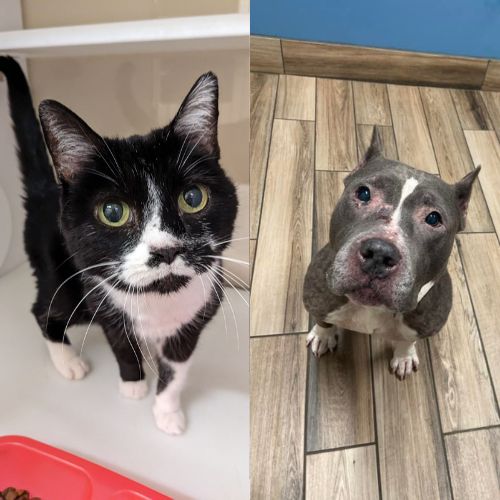Spring has sprung! This spectacular season means beautiful blooms, glorious greenery…and awful allergies. Pets can suffer from pollen just as much as people do.
Unrelenting itchiness, sneezing that just won’t stop, skin that feels like it’s on fire: Allergies can be terribly painful for pets. You want your fur babies to live their best lives, and they can’t do that with allergies. We’re here to help.
So. Much. Itchiness.
Itchy eyes, itchy ears, itchy skin, itchy delicate parts—allergies are absolutely no fun. Even worse, they can cause serious medical issues.
Signs your pet may be suffering from allergies include:
Scratching and biting: Imagine having poison ivy all over your body. That’s how intense allergies can feel for your pet. Your dog or cat might tear or bite at the skin like crazy to try to relieve the itchiness, which can lead to rashes, skin lesions, and—with broken skin—even infection.
Red and inflamed skin: Again, if your pet is scratching or biting intensely to try to relieve skin discomfort, this behavior will only make for more problems and pain. Secondary infection from scratching and biting at the skin is a real risk.
Excessive shedding: Allergies dry out the skin, which can manifest as excessive hair loss, patchy fur, and dandruff.
Excessive licking: Compulsive paw licking is often a sign of allergies in dogs. Allergies trigger histamines, which are chemicals produced by the immune system that travel to the extremities. While paw licking is usually normal grooming behavior in cats, cats with allergies may excessively lick their paws, bellies, legs, or hindquarters.
Excessive grooming on the face or ears: Excessive rubbing of the face or ears could also be related to an increase in histamines.
Scooting: Another sign of uncomfortable itchiness is scooting or excessively licking the anal region. This behavior could also be a sign of anal gland issues. Your vet will determine a diagnosis and recommend treatment to help.
Chronic ear infections: Ear infections are fairly common in pets, especially dogs with floppy flappers. The most common signs are red, waxy ears, and head-shaking. If your pet has ear infections over and over and over, that could be a sign of allergies.
Sneezing: Histamine responses in pets are like sneezing and tearing up for people. Allergies can cause post-nasal drips and sneezing in pets, too.
Respiratory issues: Coughing, wheezing, difficulty breathing—these signs are urgent and must be addressed right away. Respiratory symptoms from allergies are not as prevalent, but they are serious and may indicate other health problems. Respiratory issues affect cats more than dogs, as cats are more susceptible to environmental pollutants. Allergic bronchitis in cats is commonly called feline asthma.
Prevention, Prevention, Prevention!
We can’t say it enough—keeping your fur baby on year-round parasite prevention is absolutely key to good health and happiness. Plus, preventative products can even help with allergies!
Did you know itchiness can be caused by an allergic reaction to flea saliva? That’s called flea dermatitis, and this itchy skin disease shows up as redness, bumps, pustules, hot spots, and scabs. Gross, and ouch.
Scary? You bet. Parasites such as ticks and intestinal worms are a huge threat to your pet, and can even be fatal. It only takes one bite one time for an infected mosquito to transfer heartworms to your fur baby, and treatment is difficult and expensive. Your pet is so worth it to be on prevention.
What to Do for Your Pet
Call us for a visit! We have many prescription medications at the ready to relieve your pet from the pain of seasonal or even chronic allergies.
Many pets can safely take over-the-counter antihistamines—but please check with us before you administer anything to your fur baby. It’s essential for your veterinarian to make a professional medical diagnosis first, and, if recommended, ensure your pet gets the right medication and dosage.
We can often diagnose and treat your pet based on prevailing physical symptoms. Expansive allergy testing is also available. A blood test can pinpoint the exact allergens causing your pet’s allergic reaction.
Pet parents know: Pets are as unique as people. We treat each patient as an individual and every pet like family. If your fur baby is suffering from allergies, rest assured we will create a personalized treatment plan.

brought to you by pollen.
To Manage, Not Cure
Understandably, we see an increase in allergy patients during allergy season. Pets with seasonal allergies may only need medication to manage their symptoms for a few months in the spring. In the best-case scenario, allergies are mild or moderate. But even “mild” ear infections or itchy paws are unpleasant and should be treated.
We also treat many pets who need more intricate allergy care. Pets with severe allergies require more intense treatment. Pets with chronic allergies need year-round attention and care.
It’s important to understand managing allergies can be a complex, multi-faceted, even long-term process. Sometimes a good food plan—a change in diet—can make a big difference. Feeling better for life might require life-long monitoring and treatment.
The bottom line is: Allergies can be tricky. They can crop up at any time. They require expert medical attention from your veterinarian, who will find the best way to manage them and keep your pet from suffering.
We know allergies run the gamut, and every pet is special. As your other family doctor, we’re here to help your pet get exactly what he or she needs. The sooner our team can see your pet, the faster we can get your fur baby on that road to recovery.


